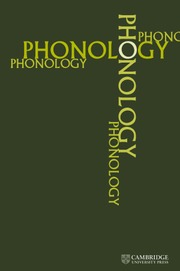Article contents
Constraint weighting and constraint domination: a formal comparison*
Published online by Cambridge University Press: 30 November 2007
Abstract
The advent of Optimality Theory has revived the interest in articulatorily and perceptually driven markedness in phonological research. To some researchers, the cross-linguistic prevalence of such markedness relations is indication that synchronic phonological grammar should include phonetic details. However, there are at least two distinct ways in which phonetics can be incorporated in an optimality-theoretic grammar: traditional constraint domination and Flemming (2001) 's proposal that the costs of constraint violations should be weighted and summed. I argue that constraint weighting is unnecessary as an innovation in Optimality Theory. The arguments are twofold. First, using constraint families with intrinsic rankings, constraint domination formally predicts the same range of phonological realisations as constraint weighting. Second, with proper constraint definitions and rankings, both the additive effect and the locus effect predicted by constraint weighting can be replicated in constraint domination.
- Type
- Research Article
- Information
- Copyright
- Copyright © Cambridge University Press 2007
References
- 5
- Cited by


